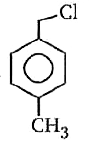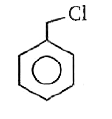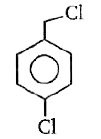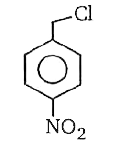Most reactive towords E.S,R :
(A)Benzene
(B)Chloro Benzene
(C)Phenyl Acetate
(D)Nitro Benzene
The correct Answer is:C
To determine which compound is most reactive towards electrophilic substitution reactions among benzene, chlorobenzene, phenyl acetate, and nitrobenzene, we can analyze the effects of substituents on the benzene ring.
1. Identify the Compounds:
- We have four compounds: benzene, chlorobenzene, phenyl acetate, and nitrobenzene.
2. Understand Electrophilic Substitution:
- Electrophilic substitution reactions are reactions where an electrophile replaces a hydrogen atom in the benzene ring. The reactivity of the benzene ring towards electrophilic substitution is influenced by the nature of substituents attached to it.
3. Analyze Each Compound:
- Benzene:
- Benzene has no substituents, making it a baseline for reactivity. It can undergo electrophilic substitution readily.
- Chlorobenzene:
- Chlorine is a -I (inductive effect) and -R (resonance effect) group, which means it withdraws electrons from the benzene ring. This deactivates the ring towards electrophilic substitution, making chlorobenzene less reactive.
- Phenyl Acetate:
- The acetate group (-OCOCH3) is an electron-donating group (+R effect). This increases the electron density on the benzene ring, making it more reactive towards electrophilic substitution compared to benzene and chlorobenzene.
- Nitrobenzene:
- The nitro group (-NO2) is a strong -I and -R group, which withdraws electrons from the benzene ring significantly. This makes nitrobenzene very deactivated and thus, it is the least reactive towards electrophilic substitution.
4. Compare Reactivity:
- Based on the analysis:
- Benzene: Moderate reactivity
- Chlorobenzene: Low reactivity
- Phenyl Acetate: High reactivity
- Nitrobenzene: Very low reactivity
5. Conclusion:
- Among the four compounds, phenyl acetate is the most reactive towards electrophilic substitution reactions due to the presence of the electron-donating acetate group.
Final Answer:
Phenyl acetate is the most reactive towards electrophilic substitution reactions.
- We have four compounds: benzene, chlorobenzene, phenyl acetate, and nitrobenzene.
- Electrophilic substitution reactions are reactions where an electrophile replaces a hydrogen atom in the benzene ring. The reactivity of the benzene ring towards electrophilic substitution is influenced by the nature of substituents attached to it.
- Benzene:
- Benzene has no substituents, making it a baseline for reactivity. It can undergo electrophilic substitution readily.
- Chlorobenzene:
- Chlorine is a -I (inductive effect) and -R (resonance effect) group, which means it withdraws electrons from the benzene ring. This deactivates the ring towards electrophilic substitution, making chlorobenzene less reactive.
- The acetate group (-OCOCH3) is an electron-donating group (+R effect). This increases the electron density on the benzene ring, making it more reactive towards electrophilic substitution compared to benzene and chlorobenzene.
- The nitro group (-NO2) is a strong -I and -R group, which withdraws electrons from the benzene ring significantly. This makes nitrobenzene very deactivated and thus, it is the least reactive towards electrophilic substitution.
- Based on the analysis:
- Benzene: Moderate reactivity
- Chlorobenzene: Low reactivity
- Phenyl Acetate: High reactivity
- Nitrobenzene: Very low reactivity
- Among the four compounds, phenyl acetate is the most reactive towards electrophilic substitution reactions due to the presence of the electron-donating acetate group.
Phenyl acetate is the most reactive towards electrophilic substitution reactions.
Topper's Solved these Questions
Similar Questions
Knowledge Check
Which of the following is most reactive towardSN2 reaction ?
A B
B C
C D
D
Which of the following is most reactive towardSN2 reaction ?
ACH2=CH−CH2−ClBPh−CH2−ClC DPh−C∣∣O−CH2−Cl
DPh−C∣∣O−CH2−Cl
Which one is the most reactive towards SN1 reaction ?
View SolutionThe most reactive towards SN1 is:
View SolutionWhich of the following compound is most reactive towards an electrophite (E+) ?
View SolutionWhich one is most reactive towards SN1 reaction?
View SolutionMost reactive halide towards SN1 reactions is
View SolutionWhich of the following is the most reactive towards ring nitration ?
View Solution
